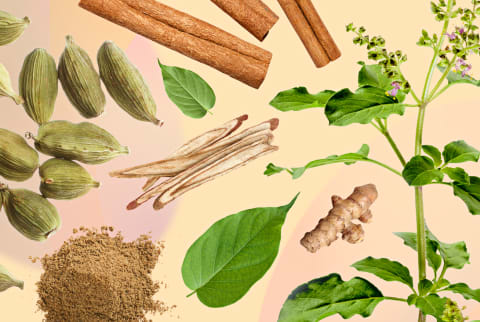Brewing teas is a great way to consume your daily dose of Ayurvedic herbs and spices, and they can be healthier alternatives to caffeinated black tea or coffee. You can also toss these plant medicines into food. Here are nine herbs and spices that are highly prized in Ayurveda and a little teaser on the benefits and applications of each: It’s an anti-inflammatory that’s a great source of antioxidants, too. Cinnamon also helps to lower blood sugar and curb cravings2. Finally, cinnamon has been found to lower cholesterol3. Its spicy kick can even help prevent bad breath, hence why some toothpastes feature it as a star ingredient. Fenugreek seeds have long been used in Ayurveda to fight against skin conditions, enhance breast milk production, and boost sexual function in men, as well as control appetite, cholesterol levels, heartburn, and inflammation. The trio is used to help promote better digestion and regular bowel movements10. It’s often prized by those who suffer from constipation. And unlike other laxatives, triphala does not force your muscles to loosen up to create a bowel movement, and it can be used on a daily basis11. Additionally, it is a natural antioxidant. Its main component, curcumin, can help reduce inflammation12, promote immunity13, protect heart health14, and even support the brain15 as we age. For starters, it can help soothe the stomach16, reduce stress, and even support skin health in some cases. Research has found that cumin can support healthy digestion18 and helps improve blood sugar control and cholesterol19. These are just some of the herbs and spices you can add to your daily diet to take that extra step toward improving your health and well-being.





